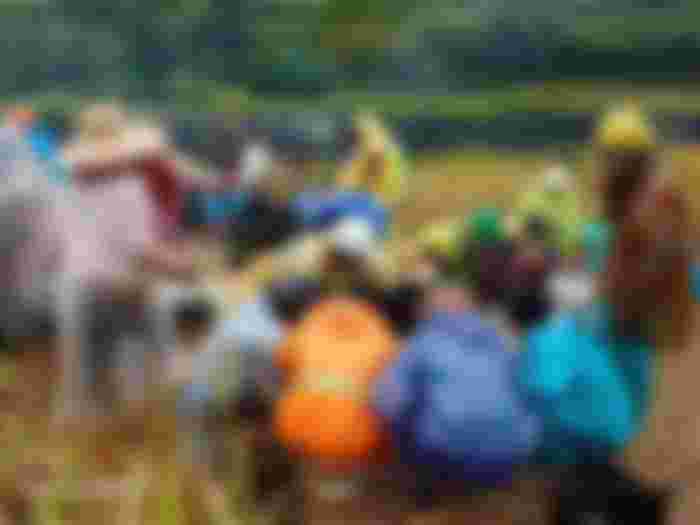>Bayanihan.(n)A Tagalog word which means mutual help;'helping each other out;helping one's other countryman;community support;community spirit;"being a hero";giving assistance without compensation.definition by-tagalog.com
@z_graeden once more.Today,I would like to talk about one of the old Filipino tradition called "bayanihan" that is already a bygone act these modern days.If this is still practiced in your place then you are lucky because you got to feel it's spirit of being in a community still filled with helping and supportive townsmen or villagers without expecting something in return nevertheless, reciprocating the act with benevolence.It is called "uv-uvvu " in our dialect
In our place,there are only two crop rotation in a year.Rice crop and legumes and/or root crops such as camote and/or vegetables come after.But people don't depend on agricultural yields,for not all have a land to farm and many are also educated and practicing their professions.After planting season is over,the people having no government jobs would look for something to gain profit.This season is rice crops harvesting.Villagers are pleased and satisfied that their labor has not gone to waste with the fields ripe of bountiful crop.It was just these last three consecutive years that the farmer's labor yielded aplenty..The past few years before were like nightmare to the villagers that rice and other crops were eaten by pests and rats leaving the poor farmers' soul disappointed.Due to the crops cheap quality many fields were abondoned.Elders performed traditional cultures repeatedly to ward off evils that they say contributed to the destruction of crops by pests.It took years before crops begun to go back to normal.
During this time of harvest and with a bounty harvest do you see and feel the spirit of bayanihan.People called to reap were not paid,they're only fed after they came from the fields and sent cooked rice and pork meat viand by the host in the evening.While at the field,of coarse they also eat to what was prepared by the host.

It is a lively spirit for stories were told men,women specially mga dalaga at binata and children eat together in circle at the mud floor with rice stalks spread at the dry mud serving as plates.

In the olden days,bayanihan was represented by men carrying a house to be transfered to another spot.But nowadays houses are built with wood and galvanized iron sheets.Many are also remodeling their old houses and are building houses made of iron metals and stone(cements,sands and gravel.) When the so-called buhos is told, men gather to help the carpenters. Women also bring whatever is available in their houses-may it be uncooked rice,glutinous rice,milled dried corn,root crops, vegetables and bread.They cook it in the site, and was eaten after the buhos is completely done.Buhos is the dialect and a Tagalog term of filling the floor/s with cement mixture.

In times of difficulties such as calamities and accidents,villagers never hesitate to lend a helping hand with each other or to others.Such as one unpleasant incident that happened years ago on a spot in our village when a bus fell off the cliff killing most of the passengers and the driver,the villagers were among the first to respond and help the victims off from the cliff.They brought there cars where casualties were ferried to the hospital.And one thing's really amazing,these people never took anything from the casualties things because of the word "lawa/lawang," it simply means a no-good or unacceptable act for we believed that karma would hit one who done done the unacceptable.
Moreover,bayanihan is also practiced during weddings and some smaller events such as christening and house dedication.I know some areas in the Philippines wherein people who do the preparations and everything to be done before,during and after the ceremony are being paid.In our place,it's not the case.Bayanihan is very much practiced.
However,as how bayanihan was defined above,anyone who is not practicing the tradition or one who is not contributing and participating would not receive much help when come a time he needed help.It is an act of reciprocating the act..
How do you call bayanihan in your dialect or language?What terms is it applied?
It is an opportunity to join Get Sponsored community..
If you want to get sponsored,I encourage u to join .https://read.cash/c/get-sponsored-2a0b It aims to sponsor quality article authors and rewards members according to community activities.
https://read.cash/c/get-sponsored-2a0b
thanks also @Ashma ,the moderator for giving chances to be sponsored



Masaya po ang bayanihan mam, lahat nagtutulungan. Same here po kahit papanu buhay pa po ang bayanihan. Yan po yata tayong mga pinoy likas na Matulungin . Morning po.nice article, worth to read.